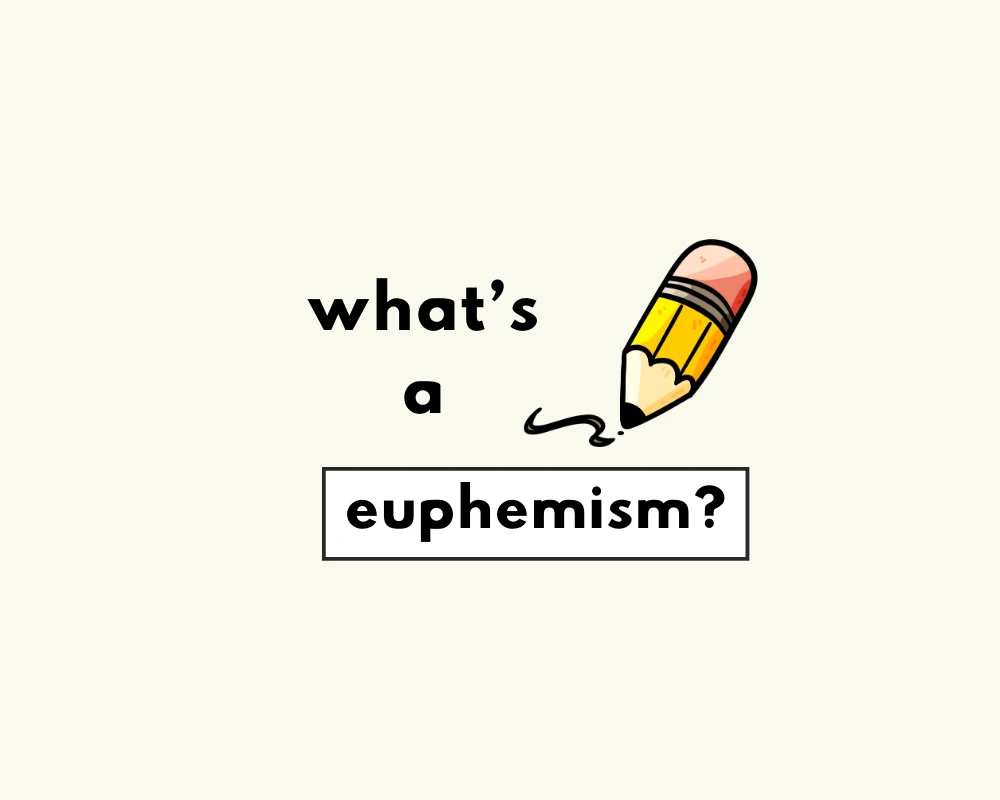Contents
Toggle
What’s a euphemism?
Have you ever heard people use phrases like let go, when what they really mean is that someone was fired (from their job)?
To use the phrase spin the truth instead of lie, or describe someone as “vertically challenged” as opposed to short—each of these words and phrases are literary techniques which we call a euphemism (pronounced you-fuh-mism). Let’s learn more about them and why they’re used in writing and conversation, in this article.
For a formal definition: [euphemisms] are a literary technique which uses “an innocuous word or expression in place of one that is deemed offensive or suggests something unpleasant”.
Phrased the #grammarflex way: it’s an easier, less harsh way of saying something that could be put more bluntly or callously.
Dictionary definitions of euphemisms
Collins Dictionary defines it as: “a polite word or expression that is used to refer to things which people may find upsetting or embarrassing to talk about, for example sex, the human body, or death”.
Merriam-Webster on euphemism: “the substitution of an agreeable or inoffensive expression for one that may offend or suggest something unpleasant”.
Oxford Learner’s Dictionary: “An indirect word or phrase that people often use to refer to something embarrassing or unpleasant, sometimes to make it seem more acceptable than it really is . . . a mild or indirect word or expression substituted for one considered to be too harsh or blunt when referring to something unpleasant or embarrassing: “downsizing” as a euphemism for cuts”.
Synonyms for euphemism
- mild alternative
- polite term
- understatement
- substitute
- genteenlism
- underplaying
- indirect term
Origin of the word euphemism
1650s, from Greek euphemismos “use of a favorable word in place of an inauspicious one, superstitious avoidance of words of ill-omen during religious ceremonies,” also of substitutions such as Eumenides for the Furies. This is from euphemizein “speak with fair words, use words of good omen”.
Common examples of euphemisms
- “Let go” instead of “fired”
- “Bit the dust” instead of “died”
- “Big boned” instead of “fat”
- “Darn” instead of “damn”
- “Spin the truth” instead of “lie”
- “Unique looking” instead of “ugly”
- “Vertically challenged” instead of “short”
- “Stepping out” instead of “cheating”
Sentences with “euphemism” in the media
My business with them is to take them out individually on little visits (my euphemism) for two or three weeks to various flocks of ewes.
—The New Yorker, 4 Dec. 2023
The various other panelists took refuge in euphemism.
—Joel Khalili, WIRED, 30 Oct. 2023
Not officially, of course; at this stage, the fact that Hayes will be the next coach of the U.S. women’s team is merely an open secret, a fait accompli that must—for now—remain swaddled by a warm blanket of euphemism.
—Rory Smith, New York Times, 10 Nov. 2023
Read about other literary devices
- What’s Alliteration?
- What is Irony?
- What is Verbal Irony?
- What is Dramatic Irony?
- What’s Situational Irony?
- What’s a Hyperbole?
Sources
- Harper, Douglas. “Etymology of euphemism.” Online Etymology Dictionary, Accessed 20 February, 2024.










